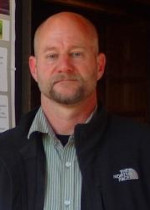Education:
1983: B.S., Biology, American University
1990: Ph.D., Pharmacology, Georgetown University
2005: M.L.S., Information & Library Science, Southern Connecticut State University
My Blog:
Visit my blog.
Areas of Interest:
Biology, Geology, Environmental Studies
Natural History
Geographic Information Systems (GIS)
Science & Technology Education
Teaching/Service/Selected Publications:
Teaching:
Visual Communication and Technology
Pacific Northwest, Present to Primeval: A History of Scientific Exploration
Disastrous Inquiries – Researching Natural Disasters
Research & the 3D Object
Service:
University Safety Advisory Committee - Chair, 2015-2017, Member 2014 - Present
Recent Publications:
Walton, D.P. (2020) The holographic landscape: 3D modeling for the HoloLens. In Makerspace and Collaborative Technologies, Edited by B. Thomsett-Scott. Rowman & Littlefield, pp 37-50
Gregory J. Retallack, James E. Martin, Adrian P. Broz, Brent H. Breithaupt, Neffra A. Matthews, and Dean P. Walton. (2018). Late Pleistocene mammoth trackway from Fossil Lake, Oregon. Palaeogeography, Palaeoclimatology, Palaeoecology. 496, Pp 192-204.
Walton, D.P. (2016, July) “Getting started with programming” [book chapter], The Librarian's Introduction to Programming Languages: A LITA Guide (LITA Guides), Edited by Beth Thomsett-Scott.
Recent Presentations:
Hufstetler, R., H. Smith, E. Hooft, and D.P. Walton. (2023, December). Strategies for scientists to communicate volcanic hazard to the public when threat of eruption is low. American Geophysical Union Annual Meeting, San Francisco, CA.
Walton, D.P., J. Hagar, and W. Blake. (2023, August) Expanding Motus Tracking to the western U.S. Coast. Society for Conservation GIS, Internet Conference. Vimeo Youtube
Walton, D.P. (2022, March) A lithic substrate for L. vulpina, a bit more than just an acidic rock - Finding answers using lichen herbarium database data. Northwest Lichenologist Meeting, California State Polytechnic University at Humboldt, CA.
Walton, D.P. (2021, August). Space-Time Cube analysis of bird movements in the HJ Andrews Experimental Forest. Society for Conservation GIS, Internet Conference.
Walton, D.P. (2020, August). An exploration of QGIS (3.14-Pi) Temporal Controller illustrating pre-, peri-, and post-nesting bird movements in the HJA Experimental Forest. Society for Conservation GIS, Internet Conference. https://youtu.be/ihFylYqq3Os
Stephens, J., Cerreta, J., Walton, D., and Sherman, P. (2020, August). Emerging tools for ornithology: Raptor habitat 3D modeling with an unmanned aircraft system (UAS): An osprey (Pandion halietus) nest case Study. In D. Bird (Chair), Emerging Tools. Symposium conducted at the meeting of the American Ornithology Society and North American Ornithology Society [online].
Walton, D.P. (2020, Feb. 7) A tale of four islands: Communicating science and conservation for places we will never likely see. UO Media Center for Science & Technology Inaugural Confernce, University of Oregon. *Poster Winner
Walton, D.P. (2018, Nov. 16). From the ground to the Hololens. Columbia River Region ASPRS Tech Exchange. American Society for Photogrammetry and Remote Sensing (ASPRS).
Walton, D.P. and J. Murray (2018, August). Making to collect, observe, and learn: Activities of the DeArmond Makerspace [Poster] International Society for Academic Makerspaces, Stanford, University, Palo Alto, CA
Walton, D.P. (2018 July). Mapping the overlooked: Capturing data on less widely recognized species. Society for Conservation GIS, Monterey, CA
Walton, D.P. (April 2017) Innovation [Panel Presentation]. "What is? Life" Symposium, Universtiy of Oregon School of Journalism and Communication, Portland, OR.
Walton, D.P. (2016, June). An Open Source Conservation Analysis & Plan for Rodrigues Island, Mauritius, [Poster]. Presented at the annual meeting of the Society for Conservation GIS (SCGIS), Pacific Grove, CA.
Professional Organizations:
American Libraries Association
National Science Teachers Association
Northwest Scientific Association
Oregon Academy of Science
Society for Conservation GIS

